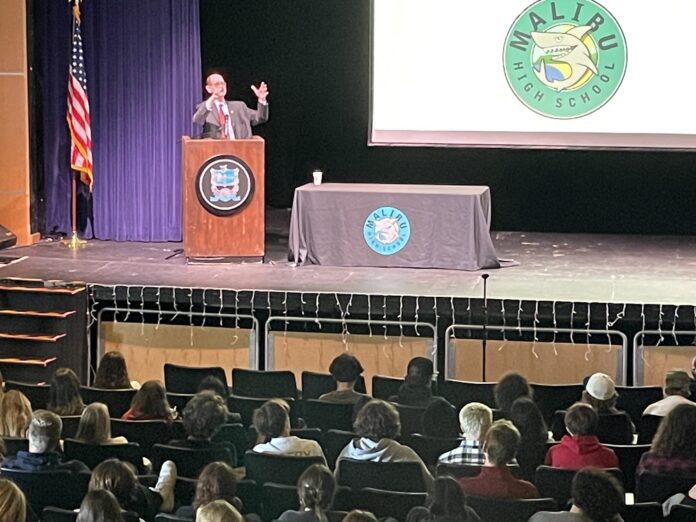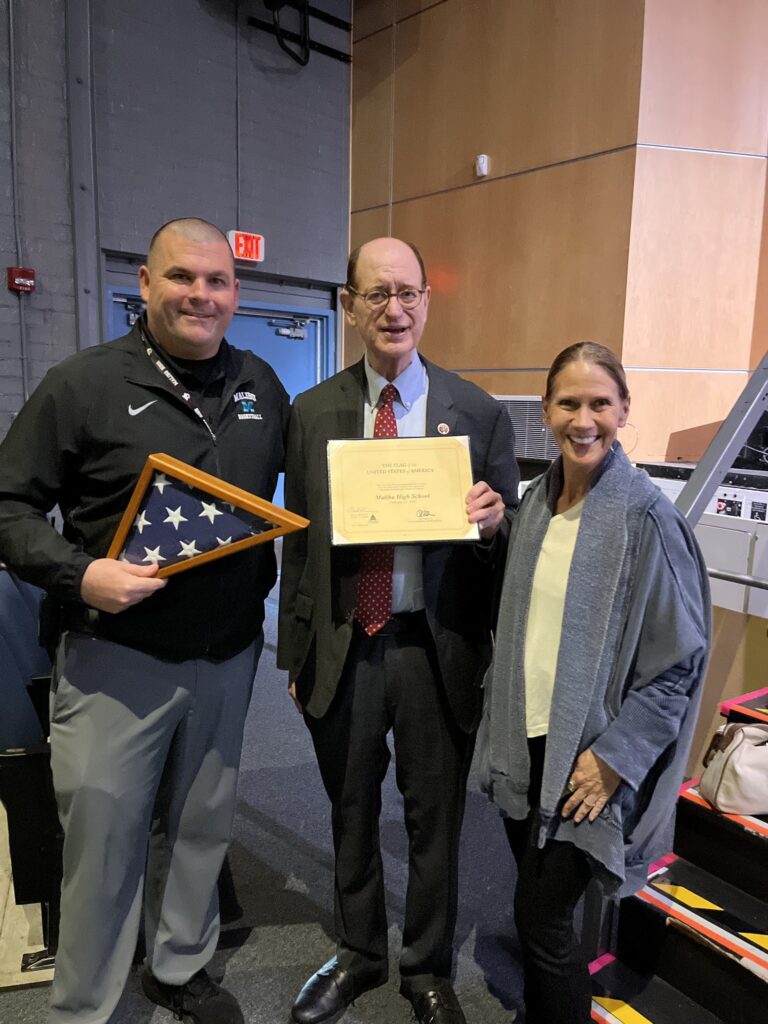
Event a powerful reminder of the importance of listening to and learning from younger constituents
By Barbara Burke
Special to The Malibu Times
Mindful of the admonition uttered long ago by social scientist Alexis de Tocqueville, “Among democratic nations, each new generation is a new people,” Congressman Brad Sherman traveled on treacherous roads on Wednesday, Feb. 21, after days of rain had caused landslides and flooding across Pacific Coast Highway and in the canyons, and all but one of the faculty and staff of Malibu High School and 60 percent of its student body, made it to school.
Those students in the school’s government and economics courses convened with Sherman for one of the most fundamentally imperative gatherings in our democracy — an intergenerational town hall.
Sherman faced somewhat of a tough crowd, for the students, keenly aware of what a complicated world they will soon lead, asked the lawmaker tough questions on an array of societal conundrums that fall within the purview of the U.S. Congress.

“I’m grateful to have had the opportunity to engage with the bright, insightful students at Malibu High School who impressed me with their eagerness to discuss and learn more about the complex issues facing our country,” Sherman said. “Their diverse questions, ranging from the gerrymandering of Congressional districts to the current crisis in the Middle East, highlighted the students’ compassion and concern that extended beyond their own community.”
Principal Patrick Miller commented about how important it is for students to have opportunities such as their colloquy with Sherman.
Miller noted that some of the students may pursue professions in politics, and most will pre-register to vote at 16 and will exercise their franchise when they turn 18.
“We want the students to have speakers, assignments and conversations that demonstrate the importance of civic responsibility,” Miller said. “When they are adults, we want them to be involved, and the Congressman’s visit was in line with our desire for the students to understand how democratic processes work.”
Sophomore Everett Briggs commented about Sherman’s discussion centering on homelessness. Briggs agreed with the Congressman that there is an imminent need for additional apartments and housing for the unhoused, but that Malibu faces obstacles in building such housing because of the length of time it takes to build — well, anything — in Malibu due to its permitting process and because building in Malibu is exorbitantly expensive.
“Among the many thought-provoking questions, a particular one that stood out to me was when I was asked to identify important issues that are not receiving as much attention as they should — a question that perfectly reflected the students’ keen global awareness and strong desire to help provide actionable solutions to the many pressing issues of our time.” Sherman commented.
“I found the Congressman’s perspective in answering my question about that interesting,” junior Jessa Kletter said. “He focused on how artificial intelligence will pose a big problem in America in the future.”
After pondering, Sherman said, “The town hall was a powerful reminder of the importance of listening to and learning from our younger constituents and I remain committed to incorporating their insightful perspectives into my legislative efforts, particularly in areas of environmental policy, education reform, and protecting our democracy, to ensure a prosperous, equitable future for all.”
Sophomore Ella Stabile reflected on the town hall, saying, “It was an enlightening experience to have Congressman Sherman educate us about the importance of the political process.”
As he is, after all, in the business of grading scholarly work and discussions in a school setting, Adam Panish, who teaches some of the government and economics classes, critiqued Sherman’s discussion.
“The Congressman was engaging, enthusiastic and informative,” Panish said. “He appeared to enjoy sharing his thoughts and speaking with the kids.”
